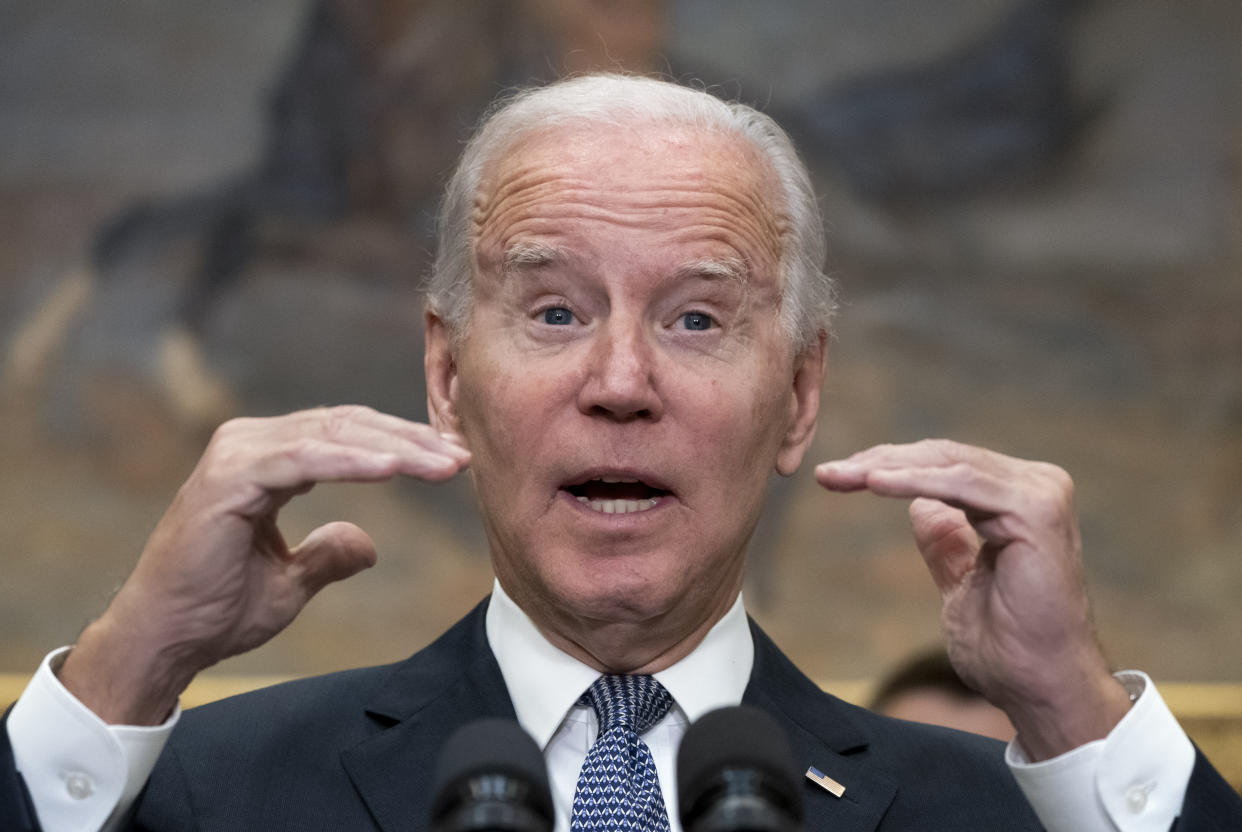One thing Biden should stop saying
A staple of President Biden’s speeches on the economy is a dubious claim about the national debt. “In my first two years in office, I have reduced the deficit by $1.7 trillion,” Biden said during a recent speech in Chicago. “More than any president has in just two years.”
Technically, true. Also, ridiculous. And soon to be overtaken by worse numbers.
Biden can get away with this whopper because the federal deficit in 2020, the year before he took office, was $3.1 trillion. The deficit for 2022, Biden’s second year in office, was $1.4 trillion. The difference is $1.7 trillion, the amount Biden claims to have saved taxpayers.
The deficit in 2020 was humongous, however, because of the COVID pandemic and several stimulus programs that pumped trillions of borrowed dollars into the economy. The annual deficit soared from $984 billion in 2019 to $3.1 trillion in 2020. After Biden took office in 2021, he signed another stimulus bill worth another $2 trillion or so. The deficit that year was $2.8 trillion, nearly as large as the year before.
The deficit dropped in 2022 because the stimulus money from the prior two years ran out. Biden's actions had nothing to do with the drop, unless you want to credit him for not seeking any further stimulus. Compared with 2019, the last year before COVID, the 2022 deficit was 40% higher. All that stimulus spending, including the bill Biden signed in 2021, also contributed to inflation that peaked at an uncomfortable 9% in 2022.
If Biden is trying to create the impression he has somehow got massive deficits under control, he is fibbing. For the first nine months of the current fiscal year, which ends Sept. 30, the deficit is already $1.4 trillion, or roughly the same as it was for all of 2022. The Congressional Budget Office forecasts the full-year deficit for 2023 will be around $1.6 trillion. But that may be a lowball estimate, given that the pace of borrowing for the first nine months is running higher.
Biden could still concoct a misleading budget claim to use in the heat of the 2024 presidential campaign. Let’s say the 2023 deficit is a flat $2 trillion. That’s still $1.1 trillion less than during the anomalous COVID year of 2020. So he could say he’s lowered annual deficits by $1.1 trillion during his first three years in office. What he won’t say, of course, is that during his first three years, the national debt grew by more than $5 trillion. Better to make a huge increase sound like a decline, and hope voters don’t figure it out.
[Drop Rick Newman a note, follow him on Twitter, or sign up for his newsletter.]

Almost no politician is honest about the national debt and America’s addiction to borrowing, so Biden’s evasions are relatively mainstream. Republicans’ preferred myth is that lower taxes and smaller government would boost growth so much that tax revenues would soar, shrinking annual deficits and stabilizing the government’s finances. Except that didn’t happen at all the last time they tried it, when President Donald Trump signed a huge package of tax cuts into law at the end of 2017.
Some Democrats think deficits don’t matter. Others want to reduce deficits by hiking taxes on businesses and the wealthy. That may be inevitable if there ever is some kind of debt crisis, but absent that, it’s politically hard. Biden pushed for those types of tax increases during his first two years as president, when Democrats controlled both houses of Congress. Even with narrow majorities, Democrats couldn’t muster the votes.
Many voters aren’t realistic about the problem, either, which is why the politicians they elect get away with gobbledygook. Majorities of voters say they’re concerned about the size of the national debt, but hardly anybody wants their own taxes raised or benefits cut to deal with it.
Squabbling over the national debt and what to do about it has been a sideshow in presidential elections for the last 20 years. Each candidate accuses the others of profligacy and claims only he or she will be a trustworthy fiscal steward. It doesn’t make a difference. The problem gets progressively worse. The national debt grew substantially under George H.W. Bush, Barack Obama, and Trump, and it will grow considerably more under Biden.
What could force Washington to get serious is the looming shortfall in funding for Social Security and Medicare, which could begin to run short in a decade or less. Another problem will be interest costs taking up an uncomfortably large portion of federal spending as long as interest rates remain elevated. But candidates may have another election or two until all that borrowing really matters. There’s still time for a bit more magical thinking on deficits.
Rick Newman is a senior columnist for Yahoo Finance. Follow him on Twitter at @rickjnewman.
Click here for politics news related to business and money
Read the latest financial and business news from Yahoo Finance
